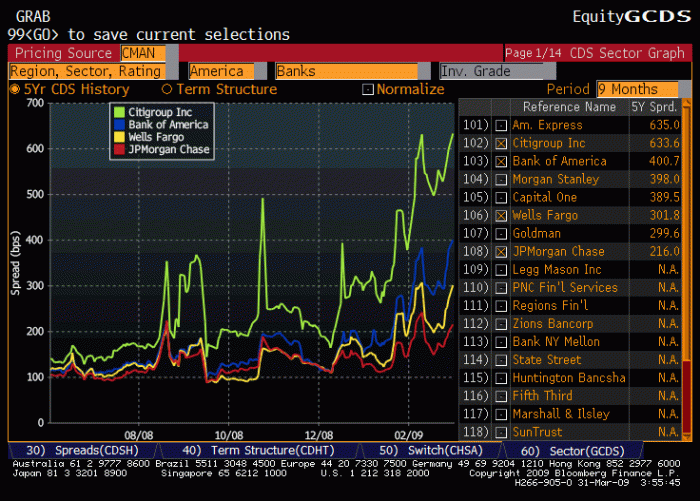"The Baseline Scenario
What happened to the global economy and what we can do about it
Will The Real Geithner Plan Please Stand Up?
With all the material and moral support for U.S. mega-financial institutions currently on the table, why are bank holding company credit default swap (CDS) spreads at new highs? (For more on how and why you might want to think about CDS spreads, we have a basic guide.)

The most plausible explanation is that creditors - unlike equity investors - are spooked by the new resolution authority that is now sought by Treasury and the Fed. This would, after all, allow the government to manage something akin to (but potentially better than, from a social perspective) a bankruptcy process for our largest financial institutions.
These creditors are right to be worried; the authority, if granted, would almost certainly be pressed by events (and creditors’ self-fulfilling runs) into use.
But, if handled right, this authority can help solve the financial mess at minimal cost to the taxpayer (although there are no magic bullets or easy exits at this stage). The key - as always in any major crisis - is decisive action. Over on wsj.com this morning, Peter Boone and I outline one way forward.
By Simon Johnson
Written by Simon Johnson
March 31, 2009 at 9:24 am"
There are three related stories that deal with the rise in CDS spreads in the past few weeks:
1) China saying that it expects the US to honor its guarantees. Many people have missed the fact that they have been claiming this about their corporate bond holdings, especially the banks. Other foreign investors have said similar things, though more politely.
2) There have been a raft of stories about insurers and pensions needing a bailout.
3) Mexico passed a law allowing the US to own more than 10% of Banamex.
These stories all have connections with the defaults of the bank’s bonds, because these are the people that hold most of them. My guess is that they would accept less money ( a haircut ), but would find a default very unwelcome, and would, at the very least in the case of foreigners, tell us to expect to pay much higher interest on loans going forward. The insurers and pensions would just send their lobbyists to the Congress. In other words, the spreads reflect the real possibility of losses and the seriousness of the issue.
Geithner has been saying all the right things about all of this, doing a good job of balancing the anger of bondholders and the need for the US to seize a few large banks. I’ve been puzzled by the criticism, since it’s too early to tell what will happen. Just like the FDIC, we’re not going to announce such a move until it happens.
Citi has been selling assets. The problem with Citi might be that investors just don’t think that they can make it, even if they sell a lot of assets. They’re a good target of a seizure or lots more money, which would be hard to get.
So, although I’ve been for the Swedish Plan since Sept. 23rd, want to seize a few banks for moral hazard reasons, want bondholders to accept their risk, this seems to me to be the best option for now. In the meantime, PPIP is simply the best hybrid that could be agreed upon. Nothing more. Until this new law comes into existence, we’re stuck with PPIP, which is simply a more politically acceptable form of the original TARP, except for the FDIC involvement, I believe. But, if you want the FDIC to be able to seize large banks in the future, this involvement should be welcome, since they’re going to need more powers, staff, and funds. Just think of the Banamex problem.











































"After Bear Stearns, counterparties to banks were lulled into a false sense of security — assuming that default risks were reduced - or at least recovery rates increased - by a sort of faintly implicit guarantee from the US government against too-big-to-fail banks."
My only disagreement with this is that the implicit guarantee had been in effect since the S & L Crisis. Although there was a chance of not being bailed out, as Lehman showed, the underlying belief was that the government could not allow large and interconnected financial institutions to fail. This was so well understood, that there was really no Plan B for these large institutions.
From my perspective, the reaction to Lehman was panic at the thought that the government wouldn't intervene, and that there was no real Plan B.
I think that the idea that the people involved in this belief were adherents of zero government intervention on principle has been proven false. Rather, they believe that the government and Fed are an essential backstop to our financial system. Simply because people try to get around regulations or have them abolished for their own ends, doesn't entail that they don't welcome and depend upon government when it suits their interests. Free market rhetoric is very useful when you're trying to get the government out of your way, but it's not a binding contract on future behavior or behavior in other circumstances.
Phil Gramm and others might have actually believed their rhetoric, but the people with the real money are not so foolish as to not believe and expect that when they could really use government help, they damn well better get it. Surely actions speak louder than words, and the actions, after Lehman, said, "For God's sake help us, and don't bother mouthing nostrums about the free market, because if we go down we're taking you with us. Did you think we gave you all those donations for your eloquent defense of principles?"